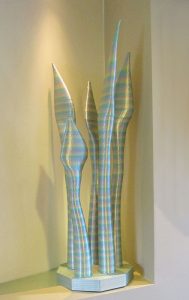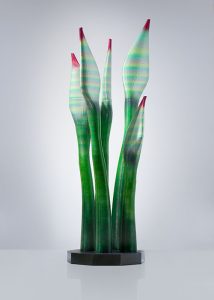 The sculptures that come out of this evolution often create a series, and it looks like that process is under way as I transform my 3D printed sculptures with hand painting.
The sculptures that come out of this evolution often create a series, and it looks like that process is under way as I transform my 3D printed sculptures with hand painting.
I’ve painted and patinated my sculptures before – the artworks Oculum, for which I added a Tiffany green patina over a shocking pink print, and Night Sky, which uses the same form but which I painted – come to mind. But the sculptures in my latest “snake plant series” take this painting to a new level.
In part it started because I’ve been playing with graffiti paints, which are bright and durable and come in a rainbow of colors, on some of my metal sculpture. I began to wonder what it would look like on my 3D-printed sculpture.
I first tried it on Viper Plant, a small version of the form I talk about in my new video “How a Sculpture Evolves, which you will definitely want to watch to see how this series evolved – or perhaps is still evolving (I’m an artist, so who knows for sure).
Then I decided to print the form 46″ tall on my 8-foot-tall Cerberus 3D Gigante 3D printer. That was an adventure, for sure. The first 2 times, I tried to use PETG, but I was just starting to play with it and wasted a lot of expensive filament learning.
Next I decided to work with some translucent red PLA, which I’ve used often. I got within about 3 hours of completion when I needed to change the filament, and the computer crashed. That really hurts when you’re more than 2 days into a print.
 I didn’t have enough of the red translucent PLA to try again, so I decided to use some silky rainbow PLA. It took 56 hours, but the print finished fine.
I didn’t have enough of the red translucent PLA to try again, so I decided to use some silky rainbow PLA. It took 56 hours, but the print finished fine.
The look (top, right), though, wasn’t quite right. The stripes were fun, but overwhelming, so I decided to break out the graffiti paint….
Right away, I saw in my mind how I wanted to paint it. The only real surprise was how, by painting the stems lightly, the stripes’ banding shows through, a look I love.
I love the little artifact – small gaps in the print – too. They weren’t apparent in the failed red translucent print, but show throughout the base and sculpture on the finished one. I think it’s because of it being Chinese filament instead of American filament, but that’s a guess.
What I know, though, is that I love this sculpture Seymora seussicus (titled after the “star” of “Little Shop of Horrors” and one of my favorite childrens’ book authors) (bottom, right), and from the reaction I’m getting, others do, too.
I’m looking forward to seeing where this approach will go from here ….
